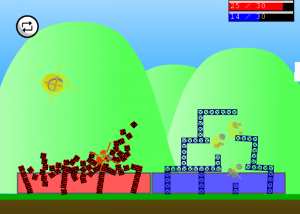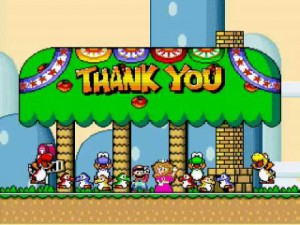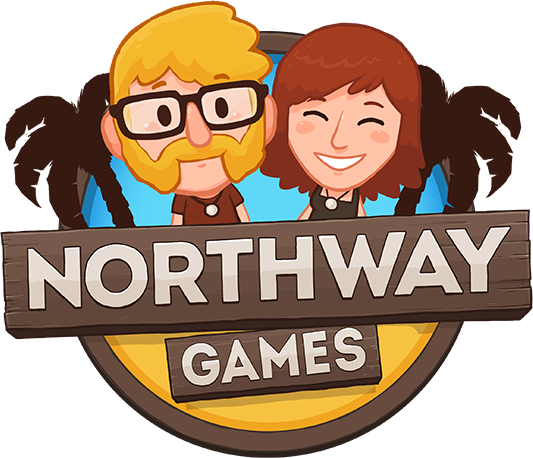Hey, I’m Alan, Colin’s brother. I just finished a game I was working on and I wanted to share some thoughts I had while working on it. Colin and Sarah were nice enough to let me post on their blog (hey it’s called Northway Games, and I am a card carrying Northway).
I just spent the last nine months developing my first game. It’s a physics puzzler that, simply put, requires you to set bombs in order to blow up objects in a crafty manner. I call it BombFace.

You could describe it as Fantastic Contraption, but with bombs instead of contraptions. I just submitted it to FlashGameLicense.com (the website where you can auction off flash games), and I’ve never felt so alive!
I also work a regular 8 to 5 Software Engineering job. Once the clock strikes five o’clock I swap my work laptop for my personal laptop and continue to program. I’m like Mr Rogers swapping shoes, but with laptops.
What I wanted to talk about, and what I’m curious about is: does anyone else feel like writing a video game is the ultimate form of playing a video game?
What I mean is, take a puzzle game like Fantastic Contraption (or BombFace). You have a design mode in which you create contraptions (or place bombs in the case of BombFace), and then enter the run mode and watch the results, hoping that your design does what you’re designed it to do.
Well that’s exactly what I’ve been doing in writing this game for the last nine months, except instead of creating contraptions I’ve been writing code. The concept of entering a run mode to see what how your design behaves is exactly the same. It’s the same process. Design, test.
What’s funny is I really didn’t set out to make a Fantastic Contraption-esque game. I wanted to make a side scroller. I think I might have stumbled into it because I’m a programmer. Playing Fantastic Contraption, and BombFace are enjoyable for the same reasons that programming is fun. Thinking about a solution, and incrementally improving your solution till you complete your goal.
This can also be applied to other games to a varying degree. For instance, when you die playing any FPS you’ll probably try to think of a way of getting past that part. Maybe it’s taking it a bit slower and sniping the guy behind the 50 cal. before anyone notices you. Maybe it’s throwing a couple grenades into the room first and closing the door. You’re thinking up solutions and then implementing them. There isn’t a strict separation between design mode and run mode, but the process is still there.
What makes writing a video game better than playing a video game you ask? Many things I would contend. Freedom, first off. Freedom is one of the reasons I believe people like Fantastic Contraption so much. There are a lot of different ways to solve a level. When writing a video game, I wouldn’t say you can do anything, but there are an infiinite number of options with huge variation. A much greater freedom than even Fantastic Contraption.
 Also, there’s the reward for finishing. There was no better feeling in my youth than beating Super Mario World for the first time. I invested so much time and energy into it, and for that reason it paid off. Well imagine spending 9 months on a game, and putting your thoughts, your likes, and your preferences into it. In some ways it represents you. Then at the end of the 9 months imagine putting it out into the world for people to judge, rate, and pay money for. You could become so successful that you could become nomadic indie game developers and literally travel around the world for years. Seriously, that could happen! Colin and Sarah are making that happen right now! Take that Mario end credits!
Also, there’s the reward for finishing. There was no better feeling in my youth than beating Super Mario World for the first time. I invested so much time and energy into it, and for that reason it paid off. Well imagine spending 9 months on a game, and putting your thoughts, your likes, and your preferences into it. In some ways it represents you. Then at the end of the 9 months imagine putting it out into the world for people to judge, rate, and pay money for. You could become so successful that you could become nomadic indie game developers and literally travel around the world for years. Seriously, that could happen! Colin and Sarah are making that happen right now! Take that Mario end credits!
Almost everyone plays video games, so why doesn’t everyone program video games? Is there a certain balance people are looking for between thinking of solutions to problems, and…shooting people? Do they just not know where to start? Maybe they have no concept of what programming is like? Well here me loud and clear folks: if you enjoy Fantastic Contraption (or BombFace for that matter), then you would enjoy programming even more.
Agree? Disagree? Hit me up in the comments.


Comments
11 responses to “BombFace & Playing/Writing Video Games”
I like your post about BombFace & Playing/Writing Video Games. Your post is very interesting. I really enjoy this. Your post is very informative.
Thanks
Kind words advertising robot. I appreciate it.
I like the post Alan. I full heartedly agree that writing video games is very much like playing them for all the reasons you posted. To answer the question – why doesn’t everyone right them, I think I’d have to quote your brother. Writing video games is hard … much harder than playing them. The level of involvement required to come up with a good collection of core mechanics is probably more challenging than playing any game I’ve tried on the market. Also, polishing a game is the ultimate grind. It takes a rather exceptional degree of stuborness to sufficiently polish a game. For those two reasons, only people who want to work hard and are also very stubborn every release a game.
Also, as a piece of shameless self promotion, my second game is coming out in the next few months and will be roughly a year and a half in the making — The Last Volcano — its all about burning villagers and virgins. So I know exactly where you’re coming from.
I will echo Fieran and say that making games is just way harder than playing them, even though they are fundamentally similar activities.
The feedback loop takes much longer in making games, there is a much higher barrier to entry, and there is no game-making equivalent currently available for the people who prefer real-time interaction and fast-paced action.
I have a lot of hope for tools that make game-making more like game-playing in these ways (for example, Stencyl, CraftStudio, etc.) but there is a long way to go.
Congrats on finishing BombFace, by the way. :)
So the consensus is difficulty level? I think there’s something to that. I think comparing difficulty between the two is another place where the analogy breaks down.
A lot of games require a hand/eye reaction time that makes it almost impossible for human beings(Battle Toads anyone?). Where-as what programming really requires is commitment.
First and foremost, congratulations on completing Bomb-Face, Alain. As an artist, I would have to say that the hardest part about any creative endeavour is simply beginning it, staying with it, and finally, completing it.
Many people have “brain-crack” (an idea that have, but are not willing to see it realized for fear that they will never have another good idea like it). And so, many people out there don’t even start a project. For those who do, it’s rare that a lot of people finish it. Again, this 99-yard-dash allows a lot of people to “be working on something.” What happens when you finish it? What if it’s not good enough?
As a screenwriter and filmmaker, I find that I am of the rare few who are self-motivated enough to push through the insecurities and doubts and do it anyway. That’s where the sense of completion, catharsis and inevitable pride come from: completing something and sending it out into the world.
I think there is a great balance between being a programmer (logic based side of the brain) and being an artist (artistic side of the brain…obviously). You need to create the code and it has to be more involved than PONG. There is the aesthetic to it.
To sum up, I think you’ve done an amazing thing in creating a game, completing a project, and hopefully there are more. Oh, and I better not have to pay to play this one. Kidding! Or not…
Interesting post, Alan. Being a designer/programmer myself, I enjoy the same kinds of games, ones that let you engage with the design process.
But I feel that there is a clear gap between games/tools that let the player act as designer and player alternately (as in ‘edit your level’ then ‘play your level’) and games that include the design process as part of the core game mechanics. This latter style is what I plan to spend a large chunk of my game design career investigating. I think it is still under-represented, although there are some obvious stand-outs (Minecraft, Fantastic Contraption, Banjo-Kazooie: Nuts and Bolts, to name a few).
IMO, it’s perfectly fine to cater to players who only want to go part way up a particular difficultly slope. In the same way that it’s okay for Journey to exist and appeal to players who have little desire for fast twitch controls or lengthy dialogue trees, it’s also okay for Super Meat Boy and Mass Effect to exist. I find this similar to some players enjoying Banjo Kazooie: N&B, others enjoying SpaceChem, and others crossing over into game design itself and poking around with Game Maker, Unity etc. Not everyone wants to go all the way up to writing their own Flash game, which is fine. And even programmers don’t always want to be programming, I find creative play rewarding in itself.
This post regarding the ideas of playing about the video games and the choose of effective games.
I think it really is the time commitment. The older we get the more valuable time becomes as a resource.
I worked on the game Spacechem because after playing some of Zach Barth’s previous games I knew that it would be just like the games you described: something that gives you a set of rules to follow but the absolute freedom to use those rules in any way you can to get to finish a level. Even finishing the first few levels of spacechem gave me a rush once I finished them, but very early on I knew I would never finish the game.
I’m now working on a game with a friend, and I’m starting to feel like that may be a weakness on my part. I’m committing myself to using Construct 2 to build a game. It’s not coding, but I think it will at least enable me to get a sense of what it takes to build a game’s mechanics without having to write code. I’m hoping it’s not a copout, but I really don’t have the time these days to learn html5 or any other language out there at the moment.
Watching you program BombFace for months … I’d have to say difficulty is definitely a factor. You have to have the vision, then the knowledge of how to make it happen, and finally the dedication to see it through. And you were pretty dedicated!
Let’s face it, I like playing video games. Have been known to get a little addicted to a few in the past … but I have no clue how to write a game. In fact, I don’t even want to figure out how to do it – I’m too busy learning the art of knocking people out to figure out learning how to code =)
Not knowing where to start is probably a decent enough deterrent for most people :) Also, the length of commitment needed to design a game is probably too much for all but the most devoted.
Also, while you can easily be a hobby gamer, it’s much less likely to be a hobby programmer (I used to be one 20 years ago, but as the languages kept evolving, I was less and less willing to invest the time required to keep my programming skills current).